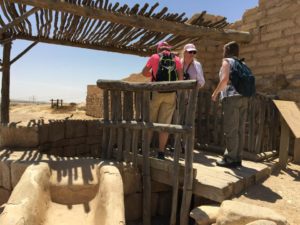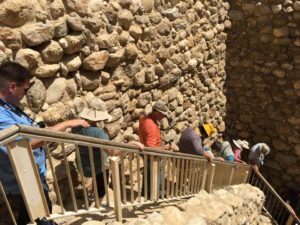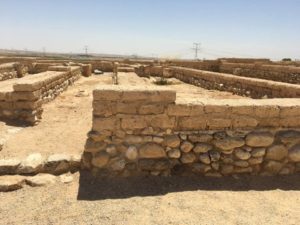March for Life: Six Take-aways
Posted on January 27, 2020
 Encouragement. It was the large numbers of millennials and iGens that thrilled my soul. Thousands of “Students for Life” signs and school groups with matching toboggans were everywhere you looked. There were thousands upon thousands of these thirty-five-and-under adults and teens. The children of these people may ultimately carry the name “Generation Life.” I pray they do.
Encouragement. It was the large numbers of millennials and iGens that thrilled my soul. Thousands of “Students for Life” signs and school groups with matching toboggans were everywhere you looked. There were thousands upon thousands of these thirty-five-and-under adults and teens. The children of these people may ultimately carry the name “Generation Life.” I pray they do.- Urgency. The Catholic church was, by far, the most represented body at the March, There are lots of things to do besides march, of course, but I’m praying that our Lord’s church can/will be a more motivated and active protective group for life in the womb. Every voice of every Christian should be saying something, in some forum, for life.
- Sadness. Of course there were images of the unborn. Some very large images, along the sidelines of the march, showed the bloody and fully recognizable mutilated babies. Those images are easily seared into the mind. However, looking at those, I felt a great degree of sadness about other babies who are quite ignored, even at events such as this one. I’m speaking of those chemical abortions that occur with pills such as RU-486 on the day of (or a few days after) conception. And I’m speaking about those babies who are left in freezers, to simply remain there indefinitely (or expire and be trashed) following in-vitro procedures. These largely overlooked and uncounted babies are not even included, generally, in the 60 million, that we at least hear about, from organizations like NRLC. There are no flags or crosses displayed for them. They are disposable children who “don’t even count” to the majority of pro-lifers. I find that incredibly sad.
 Motivation. One can hardly attend an event like the March for Life without wanting to do more for the unborn. I came home wanting to do more, say more, and influence more for the babies who are paying the ultimate earthly price for the national sin of abortion. Immediately, I checked to be sure my representative had signed the Born Alive Protection Act petition. This document is a list of those who, in oversimplified terms, want to insure that every baby born alive as a result of a botched abortion receives medical care in an effort to preserve the already born baby’s life. In other words, this bill, which has been blocked for debate over 75 times by House democrats, would prohibit just killing and trashing a living infant. Could any thinking person tell me why any cognizant representative would defend infanticide? But they are doing it on the hill everyday. Thus, the immediate challenge is to contact your congressman and either thank him for signing the petition for the Born Alive Act or to beg him/her to do so. You can find information and a list of those who have signed here: https://www.republicanwhip.gov (And thanks, Representative Mo Brooks, for signing early on.)
Motivation. One can hardly attend an event like the March for Life without wanting to do more for the unborn. I came home wanting to do more, say more, and influence more for the babies who are paying the ultimate earthly price for the national sin of abortion. Immediately, I checked to be sure my representative had signed the Born Alive Protection Act petition. This document is a list of those who, in oversimplified terms, want to insure that every baby born alive as a result of a botched abortion receives medical care in an effort to preserve the already born baby’s life. In other words, this bill, which has been blocked for debate over 75 times by House democrats, would prohibit just killing and trashing a living infant. Could any thinking person tell me why any cognizant representative would defend infanticide? But they are doing it on the hill everyday. Thus, the immediate challenge is to contact your congressman and either thank him for signing the petition for the Born Alive Act or to beg him/her to do so. You can find information and a list of those who have signed here: https://www.republicanwhip.gov (And thanks, Representative Mo Brooks, for signing early on.) Appreciation. I’m thankful for voices that are powerfully protective of life in our nation at this moment in time. It was a historic moment when our President, for the first time in history, decided to attend and speak at the March. I cannot endorse everything the president says, but I appreciate the strong words he said in behalf of the babies. They were direct and profoundly simple. I’m thankful to him for his powerful pro-life voice. I’m thankful for voices like that of Steve Scalise, who is the strong arm for the Born Alive Act. I’m thankful for the work of Jeanne Mancini and others who organize the March and are tireless in their efforts for the unborn on a national level through the year. I’m acutely grateful to live in a country in which I can find myself in the middle of tens of thousands of people on the national mall making a statement of conscience about a principle of righteousness. Though the principle (of the Biblical sanctity of life) has been trodden underfoot, it’s still an extreme manifestation of liberty that we can march en masse from the Washington monument to the Supreme Court with our message without fear of persecution and with the protection of our government. May we never take the liberty for granted and further, may we feel a personal responsibility to speak, at every turn, our faith—beginning with taking the gospel to others at every opportunity. The gospel is the answer to every societal malady.
Appreciation. I’m thankful for voices that are powerfully protective of life in our nation at this moment in time. It was a historic moment when our President, for the first time in history, decided to attend and speak at the March. I cannot endorse everything the president says, but I appreciate the strong words he said in behalf of the babies. They were direct and profoundly simple. I’m thankful to him for his powerful pro-life voice. I’m thankful for voices like that of Steve Scalise, who is the strong arm for the Born Alive Act. I’m thankful for the work of Jeanne Mancini and others who organize the March and are tireless in their efforts for the unborn on a national level through the year. I’m acutely grateful to live in a country in which I can find myself in the middle of tens of thousands of people on the national mall making a statement of conscience about a principle of righteousness. Though the principle (of the Biblical sanctity of life) has been trodden underfoot, it’s still an extreme manifestation of liberty that we can march en masse from the Washington monument to the Supreme Court with our message without fear of persecution and with the protection of our government. May we never take the liberty for granted and further, may we feel a personal responsibility to speak, at every turn, our faith—beginning with taking the gospel to others at every opportunity. The gospel is the answer to every societal malady. Outrage. The lack of logic on the posters of the few who showed up in support of the pro-choice movement was just that—outrageous: “Pro-Life Hypocrites…Didn’t see ya’ at the March for Climate Control?” Seriously?….Could there be any conscience-driven person who could, in any universe, equate the hypothesis that man can significantly influence the weather with the historical fact of man’s destructive influence through the Roe v. Wade Supreme Court decision of 1973? That’s outrageous.To propose that these two concerns are on the same plane of urgency is absurdity.
Outrage. The lack of logic on the posters of the few who showed up in support of the pro-choice movement was just that—outrageous: “Pro-Life Hypocrites…Didn’t see ya’ at the March for Climate Control?” Seriously?….Could there be any conscience-driven person who could, in any universe, equate the hypothesis that man can significantly influence the weather with the historical fact of man’s destructive influence through the Roe v. Wade Supreme Court decision of 1973? That’s outrageous.To propose that these two concerns are on the same plane of urgency is absurdity.

 Finally, this is not exactly a take-away, because I’ve shared this treasure for a lifetime. I took this precious gift with me and brought it back home: the gift of fellowship with sisters. Twenty-four hours in the car and ten miles walking around Capitol Hill with a focus of protecting unborn life has a way of bringing sisters together like no regular fellowship meal (though we’re all about them, too) probably ever will. Our conversations, prayers, shared spaces and debacles were all catalysts for memories and for a hope to do it again with more sisters. So thanks, Lindsey Van Hook, for the idea of the trek (and the vendor pretzels at 4 pm after skipping most of breakfast and all of lunch…It’s hard to decide for which of those I was most thankful.) We’re all most thankful to God for constant provision and protection.
Finally, this is not exactly a take-away, because I’ve shared this treasure for a lifetime. I took this precious gift with me and brought it back home: the gift of fellowship with sisters. Twenty-four hours in the car and ten miles walking around Capitol Hill with a focus of protecting unborn life has a way of bringing sisters together like no regular fellowship meal (though we’re all about them, too) probably ever will. Our conversations, prayers, shared spaces and debacles were all catalysts for memories and for a hope to do it again with more sisters. So thanks, Lindsey Van Hook, for the idea of the trek (and the vendor pretzels at 4 pm after skipping most of breakfast and all of lunch…It’s hard to decide for which of those I was most thankful.) We’re all most thankful to God for constant provision and protection.
 When I hang a new calendar, looking over the spent and tattered one I’m putting in that file cabinet…the cabinet that now has a stack of gridded sheets that represent the business, the slammed schedules, the birthday parties, the travel. as well as the mundane housecleaning, cabin cleaning, and mending days of the past year, I always try and think about the big picture. Every little square in that twelve page card stock and pocketed book that I’m filing away was a day of movement. Every square was movement toward heaven or away from it. We live sadness and hope. We live purpose and appointments. We live fun and fervor. But we never live static. Each turn of the page is a progression toward eternity. What makes each square so precious is that one square will be the last one.
When I hang a new calendar, looking over the spent and tattered one I’m putting in that file cabinet…the cabinet that now has a stack of gridded sheets that represent the business, the slammed schedules, the birthday parties, the travel. as well as the mundane housecleaning, cabin cleaning, and mending days of the past year, I always try and think about the big picture. Every little square in that twelve page card stock and pocketed book that I’m filing away was a day of movement. Every square was movement toward heaven or away from it. We live sadness and hope. We live purpose and appointments. We live fun and fervor. But we never live static. Each turn of the page is a progression toward eternity. What makes each square so precious is that one square will be the last one. It was still our first full day of traveling in Israel. During the early afternoon we saw the ruins of a civilization that played a role of major importance in Bible History from the time of Abraham to the close of the Old Testament: Beersheba. First named by Abraham in Genesis 21, its name means “well of the oath,” thus named because of the oath made with Abimelech. (Photo below is an Iron age well in Beersheba, but very reminiscent of the wells of Abraham. It doesn’t take long to figure out in this Negev desert why there were contentions over the wells. Water is a valuable commodity, to this day, in this part of the world.)
It was still our first full day of traveling in Israel. During the early afternoon we saw the ruins of a civilization that played a role of major importance in Bible History from the time of Abraham to the close of the Old Testament: Beersheba. First named by Abraham in Genesis 21, its name means “well of the oath,” thus named because of the oath made with Abimelech. (Photo below is an Iron age well in Beersheba, but very reminiscent of the wells of Abraham. It doesn’t take long to figure out in this Negev desert why there were contentions over the wells. Water is a valuable commodity, to this day, in this part of the world.)

 Significantly, I Samuel 8:2 tells us that Samuel’s sons, Joel and Abiah, were judges in Beersheba. Verse three tells us that they failed to walk in the way of Samuel, but rather took bribes and perverted judgment. This was in direct violation of Deuteronomy 16: 18-19. The Israelites clamored for a human king at this time, in a bold-faced rejection of their current king, Jehovah, using the depravity of Joel and Abiah as the catalyst excuse for rejecting God: Behold, thou art old, and thy sons walk not in thy ways: now make us a king to judge us like all the nations (vs 5).
Significantly, I Samuel 8:2 tells us that Samuel’s sons, Joel and Abiah, were judges in Beersheba. Verse three tells us that they failed to walk in the way of Samuel, but rather took bribes and perverted judgment. This was in direct violation of Deuteronomy 16: 18-19. The Israelites clamored for a human king at this time, in a bold-faced rejection of their current king, Jehovah, using the depravity of Joel and Abiah as the catalyst excuse for rejecting God: Behold, thou art old, and thy sons walk not in thy ways: now make us a king to judge us like all the nations (vs 5).
